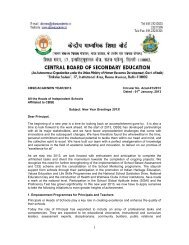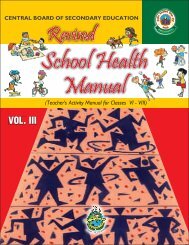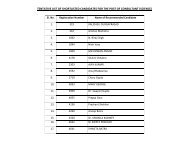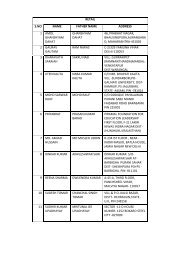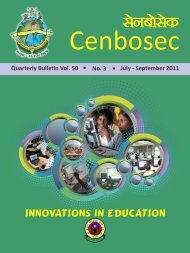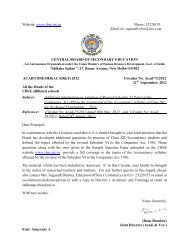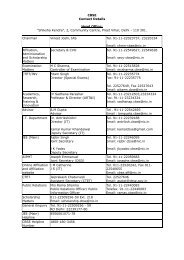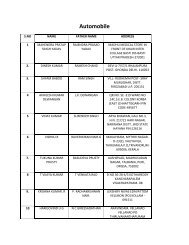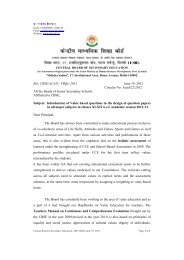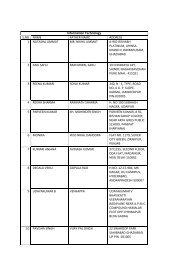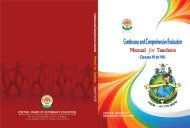Class IX - XII - CBSE
Class IX - XII - CBSE
Class IX - XII - CBSE
You also want an ePaper? Increase the reach of your titles
YUMPU automatically turns print PDFs into web optimized ePapers that Google loves.
1GOOD BEHAVIOUR IN HUMAN INTERACTION<strong>Class</strong>: <strong>IX</strong>-<strong>XII</strong>Main Idea: There are some important attributes which are associated withgood behaviour. These are politeness, concern, respect for others and prosocialbehaviour. Behaviour is one important quality which makes or marsone's life. It applies to every sphere of life, including one's personal life andsocial interactions. If good behaviour is such a critical factor in successshouldn't you examine your behaviour and ask how it will affect you?Activity 1:You recently visited a city outside your own and used the local buses formoving about in town. You were impressed by the courtesy andpoliteness of the conductors. They were efficient and their authoritywas respected by the commuters. This was in sharp contrast to the busconductors in your own city who are rude.Analyze how everyone's day would be happier and smoother if theirbehaviour improved.Activity 2:ActivitiesYou are Ashish and you have been appointed asDiscipline In-charge of your class/school. Youhave been a part of the Student Council for thepast 5 months and being a very enthusiasticleader, you are liked in the school and have alarge group of friends. Another student Vishalalso has been appointed as a prefect. One day,he was not doing his duty and was caught. He
wants you to lie to cover–up for him.You refuse, and Vishal develops agrudge against you. So he startsbackbiting about you to his friends.One of your close friends realizesthat Vishal is creating problems foryou. He informs you about it. Whatwould you do to stop Vishal fromhandling your friend's circle andyour reputation at school?Activity 3:Group WorkGet into groups of 5.Let each group select a wellknown character from Indiane p i c s l i k e R a m a y a n a ,Mahabharat or The Bible etc.Each group has to list out thepositive traits of a negativecharacter and the negativetraits of a positive character.Example:a. Let group A list out the positivecharacteristics of Ravana.b. Let group B list out the negativecharacteristics of Arjuna.Activity 4:Interview four students fromyour school. Find out who theirrole models are. They shouldinclude at least two peoplefrom their family circle. Askthem why they are their rolemodels and find out what theylike about them.Ask them to identify whatcomes under the 'Skills'category and what attributesc o m e u n d e r t h e ' g o o dbehaviour' category for theserole models. Present yourfindings before the class.
2SHARING, COMPASSION, EMPATHY<strong>Class</strong>: <strong>IX</strong>-<strong>XII</strong>Main Idea: Compassion, sharing and empathy are values that not only makethe receiver happy but also bring happiness and contentment to the heartof the doer / giver.Activity 1:CharityStudents are organized in groups of 8 to 10. Each group can choose anycharity organization. This could be an old-age home, an orphanage, aschool for street children, a hospital, shelter homes, a cancer researchor an anti-tobacco organization.Once the groups have decided on a particular charity, the teacher helpsthem prepare a guideline for tasks and asks the groups to namethemselves appropriately.Examples of activities for thegroups are as follows:Taking care of the Homeless:Children collect old school orother bags that have beendiscarded but are in a usablecondition. Utility items liketoothpaste, soap, vest,socks, slippers, book,Activities
iscuits and t-shirts can bepacked in them. These can thenbe distributed in refugeecamps/shelters for homelesspeople.Children in Foster Care can besimilarly sent things as above.Here the items can vary and beage-appropriate. They cancontain toys, books, t-shirts,half pants, frocks, towels,biscuits, toffees etc.Old Age Homes: Students canvisit and spend quality time withthe elderly by playing gameslike, chess, carom, scrabble,watching DVDs etc. 'They couldchat with the residents andmake notes of the experiencesthat they narrate.' These maythen be printed in the form oflittle books and be presented tothe residents.Research Group: This group canresearch stories on kindness orm a k e a s c r a p - b o o k o fnewspaper clipping reportingacts of courage, honesty,perseverance and tolerance.
3DISCIPLINE<strong>Class</strong>: <strong>IX</strong>-<strong>XII</strong>Main Idea: Discipline relates to the structured behaviour that orders anindivididuals life and his/her social interactions. A disciplined person cancomplete immediate tasks and fullfill long term goals and expectations.Objectives:To develop right attitude to understand the expectations andconsequences of our own conduct vis-à-vis rules and regulations.Domains of DisciplinePersonalPublicSchoolActivities : The teacher discusses with the students that discipline alsoincludes respect for rules and regulations and a sense of responsibility. Ifeveryone focuses only on his / her rights, disregarding any responsibilitytowards others, it will lead to chaos and anarchy.Activity-1BrainstormingAm I a disciplined person?ActivitiesDo I abide by rules and regulations?Am I doing the right thing when noone is watching?What disrupts the discipline in theclass?How can I help in maintaining orderin my class?
Do I show self control by doingthings that are right?Do I feel good about myselfwhen I make good choices?Do I listen to my inner voice?The students reflect on the abovestatements. Each student thenspeaks on any one of the topics forabout one minute.Activity CardActivity-2Discussion: The teacher discussesthe disregard for traffic rules andthe problems caused by theviolation. The following points canbe highlights.Underage drivingIgnoring traffic rulesDrinking and drivingSpeeding etc.The teacher will then ask thestudents to go through thenewspaper reports and note downhow many such incidents arereported in a week. The teacherthen asks the students to create aposter campaigning for adhering totraffic rules. These can be put up onthe school display board or be atopic for an in assembly.Activity-3Performing artists as well as sportspeople lead disciplined lives whichenable them to excel. The classteacher divides the class into 4groups and each group researcheson an individual of National orInternational acclaim. The groupselects an inspiring incident fromthe life of the personality chosenand presents a small skit based on itto highlight the value of disciplineas a contributory factor in theirsuccess.
4 RESPONSIBILITY<strong>Class</strong>: <strong>IX</strong>-<strong>XII</strong>Main Idea: Being responsible means thing undertaking tasks with a sense ofpurpose and fulfilling them, to the best of your capability.We should know that being a responsible person involves.Objectives:a) Being honest at all the times.b) Being fairc) Being considerate, even going an extra mile for others.d) Developing self control and forgoing impulsive behaviour.e) Developing positive attitude.f) Being accountable for your decisions and actions.Activity 1:Group Discussion:What does being responsible mean? Are you happy when you are calledresponsible and why?How would you feel if someone promised to helpyou and didn't? Do you feel let down?How is helping others a sign of beingresponsible?Conclusion from Discussion:Helping others: Community, Organization,School, Family etc.Doing your work yourselfKeeping your promisesActivitiesAccepting the consequences of your actions
Activity 2:Have you ever suffered due tosomeone else's irresponsibleb e h a v i o u r ? D i s c u s s t h eexperience.How did it change your opinionabout that person?Activity 3:Read the prayer and discusshow the given qualities willhelp you to become a moreresponsible person."God give me courage to dowhat is right.Courage to speak, courage tofightFor honesty, goodness, justiceand truth;Courage to choose the good inyouth;ActivitiesCourage to own up, when I'm inthe wrong'Courage to face the day, with asong;Courage to guard my thoughtsand my tongue;Courage to choose what is rightwhen I'm young."Activity 4:How do you rate yourself on ascale 1 to 10 on responsibility?What are the weak areas youneed to work upon, list themdown. Consciously rememberthem and strive to removethem from your list. Reviewafter a month/week how youfared and how long it took youto improve an aspect.
5 RESPECT FOR LAW AND ORDER<strong>Class</strong>: <strong>IX</strong>-<strong>XII</strong>Main Idea: Law and order denotes 'the condition of normal functioning byfollowing the rule of action established by authority or the rules of acommunity or state'. It is important that one develops the right attitudetowards authority and law.Activity 1:Divide the students into groups of 5 to 8. Eachgroup is given a scenario to work with:They will have to come up with their likelyresponse to the given situation.Wherever possible, they could enact thescene, with each character explaining thereason for his /her action.Scenario-IYour father is driving down a street that has only recently been changedinto 'one way'. You are stopped by a traffic policeman. You see that someothers who were stopped are pleading with the police personnel to letthem go. You notice a few offering bribes,too. What course of action would youtake/want your father to take?What could be the consequences of payingand accepting bribes?Scenario-IIRescue vehicles [fire tenders andambulances] frequently cannot reach thescene of accident/fire as the roads areblocked by the media/ onlookers. Suggesthow this can be avoided.
ActivitiesActivity 2:Often pedestrians refuse tomake use of zebra crossingsbridges and subways to cross aroad. Observe the roadconditions at one such point inyour locality. Time how long ittakes a pedestrian, who isjaywalking, to cross the road?Also, make a note of thedangers that pedestrians face,next time you use the zebra /overhead crossing.What conclusions can you draw?Activity 3:Search the newspaper/theinternet for reports of thedamage caused to publicproperty during riots, rallies ordemonstrations.Discuss who is to be heldresponsible for the same.Come up with an advertisement/skit depicting such a situationand the proactive role thatindividuals can play. This mightbe taken up as a group activity.Activity 4:Hold a class discussion or adebate on the topic "Corruptionis the norm and thereforeshould be accepted." Suggestmeans to combat corruption.
6CONFLICT RESOLUTION<strong>Class</strong>: <strong>IX</strong>-<strong>XII</strong>Main Idea: Conflict resolution involves the methods and processes to find apeaceful resolution to a problem or crisis situation that is acceptable toboth sides.Objectives:To understand and explore the reasons behind conflicts.To help explore the ways conflicts can be resolved peacefully. To helpstudents explore ways to heal broken relationships.Activity 1:The teacher will begin with a discussion by asking students to shareincidents where they have a fight or conflict with their friends or amember of their family. Things that should be included in thediscussion- reason(s) behind the conflict, the course, outcome, and anyother thing that the students would like to share.Activity 2: My Response to Conflict.Answer the following questions honestly.1. I fight or argue when:......2. I get upset when:......3. Things that make me angry:......Activities4. What do I do when I am talking to someonewho is angry or upset?5. What do I do or feel when I am listeningto someone who is upset or angry?6. I think most people fight or argue whenthey:......7. I think the most common reason forpeople to fight or argue is/are:......
8. One good thing people getfrom arguing or fighting is:.....9. One bad thing about arguingand fighting is:......10. People generally respond toconflicts by (list two):......11. When you are really angry orupset with someone, the mostimportant thing for you to dois:......12. What do you do when you areupset at or bothered byanother student?(list three):...13. How often do you make aneffort to resolve a conflict?14. How do you feel when someonecomes and apologises to youafter a fight or argument?Activity 3:Have a class discussion for 5minutes on - "Conflict is notsynonymous with anger or violencebut tolerance."Activity 4:Analysing Conflicts: Conflictscan have both negative impactas well as positive impact.Brainstorm the table givenbelow. Give at least 6 pointsfor each.Reasons that Reasons that MakeMake Conflicts Conflicts PositiveNegativeActivity 5:Ti m e f o r R e s o l u t i o n :Brainstorm at least 6 practicalways that you can adopt toresolve conflicts.For example, soon after theconflict, move away from the placeor person. Spend some timereflecting. Think carefully aboutwhat happened? How did theconflict start? Were all argumentsreally necessary? How could youhave reacted differently?
7TEAM - WORK<strong>Class</strong>: <strong>IX</strong>-<strong>XII</strong>Main Idea: Team work is a cooperative or coordinated effort on the part ofa group of persons acting together as a team or in the interest of thecommon good. Team work subordinates the need of the individual to theneeds of group.Objectives:To sensitise students to the fact that by working together everyoneachieves more.To understand how to set goals.To foster good and responsible behaviour and leadership skills.BrainstormingThe teacher should discuss the following:What are the advantages of team-work?How important is goal setting in this context?What is your responsibility as a team player?Everyone in the team may have a different point of view. Do you agree?If yes, how will you deal with such a difference?ACTIVITY 1The teacher lays emphasis on the importance of goal setting and discussesthe following points:Everyone needs to set goals in life as individuals and as a collective.The goals must be realistic and achievable.You should not give up your goal if you face obstacles.The group should work hard andsystematically achieve yourgoals.Having a goal is necessaryfor success.
Value Focus: Relevance of goalsetting in team work.The teacher sets the tasks for herstudents by asking them to preparea newsletter for the school coveringthe activities of the entire schoolfor four weeks.She assigns topics for thenewsletter and creates groups. Thetopics can focus on schoolactivities, assembly, intrahousecompetitions, games and matches.After collecting material the groupreassemble and together preparethe newsletter. Through thisactivity they learn the associatedvalues: responsibility, creativity,team bonding, respect for others,discipline, value of time as well asimportance of goal setting.ACTIVITY-2Characteristics of EffectiveTeams: Brainstorm at least 8characteristics that maketeamwork effective.For example, the team musthave a clear goal.Sharing tasks organisation andplanning.ACTIVITY- 3Value: Respecting differences.The teacher is to give each memberof the class a sheet of paper andinstruct them to fold the paper inActivitieshalf and further fold it in half againto form a triangle. Tell the studentsto rip-off the lower right corner andunfold the paper. The papers willlook different.<strong>Class</strong> discussion to be then held onthe following:How does this illustrate that weare different and alike?O u r p e r c e p t i o n s a n dunderstanding of the sameinstructions might be different.Through this activity the teacherexplains how differences existamong people and how important itis for each member of the team tounderstand and respect differencesand perceptions as well as clarity ofobjectives.ACTIVITY- 4Value Focus: Teamwork.Associated values learnt: creativity,character building, respect forothers, celebrating diversity, andovercoming shyness.The teacher will ask the students toresearch Mahatma Gandhi's life andprepare a short play on those stagesof his life where he expresses hisviews on untouchability orcommunal harmony.The students have to present theirplay before an assembly.
8 HONESTY AND INTEGRITY<strong>Class</strong>: <strong>IX</strong>-<strong>XII</strong>Main Idea: Honesty is defined as the quality or fact of being truthful,upright and fair. Integrity is regarded as the ability to follow/adhere to astrict moral and ethical conduct.Activity 1:Research newspapers: Create a scrap book where you paste theincidents of honest deeds of the common man, for example:autorickshaw driver returning lakhs of rupees to its owner, a personwho had lift them in the seat while going off in a hurry, policemendeclining bribe etc.Activity 2:A student gets his exam answer sheets and discovers that there was atotalling error and the teacher has given more marks. He gets his marksrectified but he becomes the butt of jokes for his classmates.How will you react in a similar situation? Do you think he was wrong? Ifnot, how will you influence you classmate to think otherwise?REPORTCARD
ActivitiesActivity 3:You are in a supermarket withyour friends and find yourfriend shoplifting.a. W h a t w i l l b e y o u rreaction?b. Will you allow peerpressure to restrain youfrom calling authorities?c. Create a similar classroomdrama and ask each childto write his/her reaction.Collect and analyse theresult. What did you find?How can the situation beredeemed? Have a Fishbowldiscussion for the same. What arethe results after discussion?Activity 4:A small skit with 4-5 characterswherein you have to come outwith instances which highlightthe impact of honesty andintegrity.For example:You know that your parents will bedisappointed to see your low gradesin the exam. To avoid disclosure,you change the real marks. Neitheryour teacher nor your parents get toknow of the same. Will you confessor keep this misdeed to yourself?Brainstorm and find similarsituations and problems and discussways to deal with it in an honest andopen manner.Activity 5:Divide the class into 4-5 groups.Each group will go to differentclasses and to the teachers togather their views on honestyand integrity.Collect the results of eachgroup and have a discussion.C r e a t e a n a w a r e n e s scampaign, extolling the virtuesof honesty and integrity.Food for thought:Watch your thoughts, theybecome words.Watch your words, theybecome actions.Watch your actions, theybecome character.Watch your character, theybecome your destiny.
9 COURTESY<strong>Class</strong>: <strong>IX</strong>-<strong>XII</strong>Main Idea : Values like courtesy and politeness make us better humanbeings. Courtesy will leave imprints on the minds and hearts of people wemeet during our journey of life. They enhance the degrees andqualifications we acquire from academic learning.
Activity 1:Suppose you are alone in thehouse and a guest arrivesunexpectedly. Meanwhile yourfriends are calling you to playoutside with them but knowthat you are also expected tospend one hour with your guesttill your parents arrive. Whatwill be your behaviour in thatsituation? Discuss with friendswhat they will do in such asituation. What do you thinkwould be appropriate conductand why?Activity 2:It is a special Diwali as yourfather got promoted to a higherpost. You are celebrating Diwaliwith friends and relatives andburning crackers. This iscausing smoke and noisepollution. Your neighbour'sgrandma suffers from asthmawhich is further aggravated bys m o k e . T h e n e i g h b o u rapproaches you with therequest to stop burningcrackers. What will be yourreaction? Put yourself in yourneighbour's shoes and enact asimilar scene with your friends.Activity 3:Your parents are away and youbeing the elder among yoursiblings are responsible for thehouse and family.ActivitiesYour younger brother came latefrom his game of tennis and youscolded him without listeningto his explanation. Later on youfind that he had saved someonein a roadside accident whilecoming back home. What willbe your reaction? What will youdo in a similar situation? Discusssimilar situation with yourpeers and note their reactions.Activity 4:Give two examples of politepersons from your personal lifeand give details about theincidents or events justifying it.How do these qualities makepeople appreciate and valuethem more? Make a poster ofbasic courtesies you expectfrom others and put it on yourclass wall.At the end of the month preparea checklist where you haveactually practiced these basiccourtesies. Has there been achange in your outlook?
10 FOSTERING RESPECT FOR DIFFERENCES<strong>Class</strong>: <strong>IX</strong>-<strong>XII</strong>Celebrating differences:Thinking points:What would it be like if all the students in the school were similar inappearance and behaviour?Are you able to get along with different kinds of people?How can one show tolerance towards others?
ActivitiesActivity 1:Visit friends of differentreligions and celebratefestivals with them.Write 2 things that can makethe world a more tolerantplace.Make a list of incidents whereyou have seen people treatingothers unkindly.Activity 2:Tolerance in day-to-day life:Intolerance lies at the root ofmost conflicts in the worldtoday, be it at a local or aglobal level.Discuss:a. Religious intoleranceb. Racial discriminationc. Rich-poor divided. Any otherWhat was the conclusion from yourdiscussion? Divide into groups anduse any of the following methodsfor the same:1. Street Plays2. Poster campaignActivity 3:Celebrateall festivals in yourclass by:a. Decorating your classaccording to the festival.b. Bringing food prepared tosignify a particularfestival.c. Bringing food of theregional / local flavour.d. Discussing the spiritbehind each festival.Reflection: Tick tock! The clock never stops!
11 SENSITIVITY TO ENVIRONMENT<strong>Class</strong>: <strong>IX</strong>-<strong>XII</strong>Main Idea : The impact we have on the environment today is making a bigdifference on the world for future generations. It is our responsibility to carefor our planet and ensure its well-being.Objectives:To sensitise children about their environment and motivate them to care forthe same.Explicit Values Focus:Sensitivity to environmentResponsibilityAccountabilityACTIVITY - 1ActivitiesThe teacher will divide the class into 4 groups. Students begin a fishbowldiscussion on environmental concerns. The discussion should centre on issuessuch as consideration and regard for other living species on the planet andresponsibility while using the natural resources.a. Global warming: The air has warmed dramatically over the past 30 years,according to a new study of archived data collected by weather balloons.This has resulted in Green House Effect. Many species of flora and faunahave perished.b. Rivers, forests, estuaries, endangered species and national parks, whichare our natural heritage, are being polluted by mining and factory wastes.c. Need to change the outlook of human beings towards environment anddevelop a relation of partnership rather than dominance.Allow 10 minutes of discussion and 10 minutes for the feedback.Focus questions for research may include:What steps have been taken by the government toconserve the natural resources?What technologies can be used to stop waterpollution?Do we have any right to destroy forests and habitatsof other species?What responsibilities do we have towardsenvironment?After gathering information, the students get back intotheir original groups and discuss the information theyobtained from the different sources about the focusquestions and how the awareness of environmentconcerns could be implemented in the school.
ACTIVITY - 2Discuss: The teacher will discuss withthe students that educating for asustainable future is not so muchabout long term final objective as isabout the process of learning to makedecisions that consider the long termeconomy, ecology and equity of allcommunities.The teacher will then divide the classinto groups of five and discusspollution and the harmful effects ofthem.Each group studies one type ofpollution - air, water, noise orland.Each group finds out causes,effects and solution.The groups make presentation on thefindings.Each group also prepares abanner or placard on theprevention of noise pollution.The placards can be displayed attraffic signals near the school,r e s i d e n t i a l c o l o n i e s a n dhospitals.ACTIVITY - 3Value Focus: Responsibility towardsenvironment.Reflection: The teacher will ask thestudents to discuss manmade threatsto our natural environment and howman's apathy towards environmentwill lead to catastrophe. The teacherwill emphasise how each individualcan contribute to protecting theenvironment. Thereafter, the classwill be divided into two groups afterexplaining the role of reducing andrecycling in protecting theenvironment.Group-I: Old newspapers and wastepaper can be used in papier machineto create various utility items like cliptrays, pen holders, paper lanterns,lamp shades etc.Old clothes, toys, books, bags andother waste objects at home can beused for crafting utility item likemagazine holders, files and folders,aprons, laundry bags, pouches andpurses, shopping bags etc.An exhibition-cum-sale of the abovementioned articles can be organizedand the earnings can be donated tosome NGO associated with theenvironmental concern. This willfurther help a social cause.Group-II: Make paper/cloth bags anddistribute in your locality anddiscourage them from usingpolythene bags. Also, spread thisawareness among vendors in yourlocality. Create slogans to propagatethe same.




